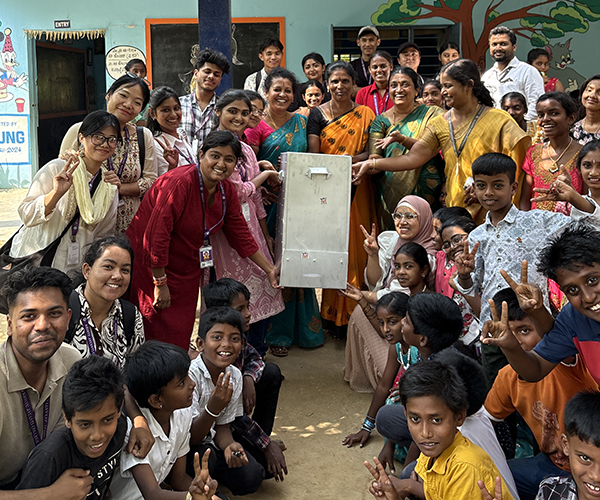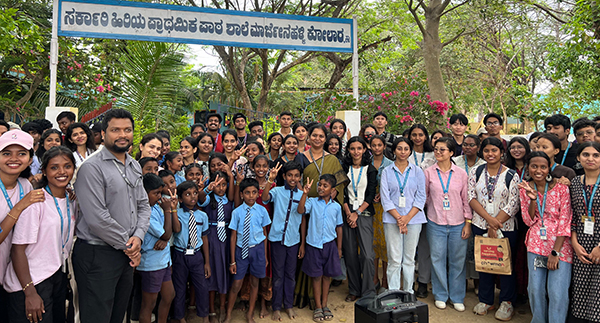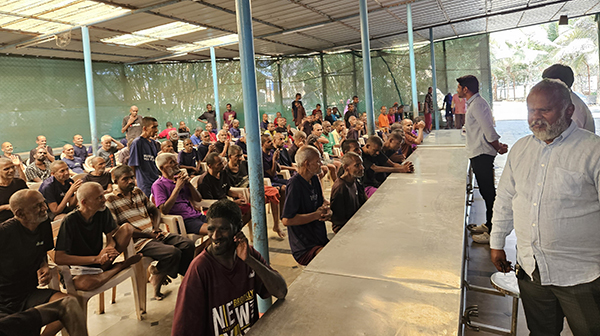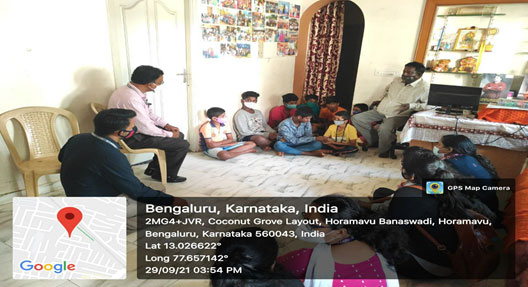
Student Extension Activities
Extension Activity - Village Development Programme
Date: 09 April 2025
The Department of Economics organised an Extension Activity titled Village Development Programme on 9th April 2025 at Marjenahalli, Kolar District, Karnataka, involving students of I M.Sc. Economics. The programme was designed to integrate academic learning with grassroots-level exposure and community service, in alignment with the Sustainable Development Goals (SDGs). As part of the initiative, students conducted activity-based learning sessions for the children at the Government Primary School, engaging them through interactive methods aimed at enhancing their classroom experience and foundational understanding. A significant highlight of the programme was the handover of a 108-capacity idly cooker to the school as a contribution towards SDG Goal 2: Zero Hunger. This gesture was intended to strengthen the Mid-Day Meal Scheme (MDM) by improving the school’s capacity to provide nutritious, hot meals efficiently to all students. In addition to the educational outreach, the students also conducted a socio-economic survey among the local community, focusing particularly on the status of health and education. The survey aimed to capture key indicators of well-being and access to basic services, contributing to the students' understanding of rural socio-economic conditions and the challenges faced by the community. The extension activity successfully combined elements of service learning, community engagement, and sustainable development, providing students with a valuable field experience while simultaneously supporting the educational and nutritional needs of the local population.

Extension Activity - Village Development Programme
Date: 03 April 2025
The Department of Economics organised an extension activity titled Village Development Project on 3rd April 2025 at Marjenahalli, Kolar District. This initiative was undertaken for the students of II M.A. Economics, II B.A. Applied Economics, and III B.A. Applied Economics, with the objective of bridging academic learning with community-oriented field experience. As part of the programme, students visited the Village Panchayat Office, where they interacted with local administrative officials and gained firsthand knowledge of grassroots governance, decision-making processes, and developmental schemes implemented at the village level. They also visited the Primary Health Centre (PHC) in Marjenahalli, which offered insights into the rural healthcare delivery system, basic medical facilities available to villagers, and the challenges faced in ensuring public health in remote areas. In addition to these learning engagements, the students conducted activity-based learning sessions at the Government Primary School in the village, facilitating interactive and educational activities for school children. As part of their outreach, they also distributed essential study materials to the students, encouraging continued interest in education. The team took part in a cleanliness drive, actively cleaning the surroundings of the school and nearby areas, thereby promoting hygiene awareness among the community. Further, the students conducted a socio-economic survey among the village households, collecting data on living standards, income sources, education levels, and access to basic amenities. Overall, the extension activity offered a comprehensive exposure to rural development practices, strengthened the students' understanding of real-world economic and social conditions, and underscored the value of civic responsibility and active community participation.

Extension Activity as Part of World NGO Day
Department of Economics organised Community Engagement Programme for MA Economics students as part of World NGO Day. On February 28, 2024, about 11 a.m., 51 students were taken to Home of Hope Doddagubbi, Bangalore. Mr. Auto Raja, the founder of Home of Hope, gave a briefing on the organization's assistance to the downtrodden people in the community. Homes of Hope is changing the lives of neglected, orphaned, and abandoned girls all over India. He added that they have established orphanages and schools and offer girls the best education, wholesome food, and affection. Students gave out groceries to the underprivileged. To keep people interested, they planned a few games and other events. They organized few games and other activities to engage the people there. The students and the charity home benefitted from the visit.

Sashakth-Let’s Empower Community Engagement Programme
The Department of Economics Organized an Orphanage visit, ‘Sashakth-let’s empower’, a community engagement programme in observance of International day of awareness of food loss & Waste. Faculty members of Department of Economics and the students of II M A Economics visited the orphanage by 3.00 p.m. On behalf of Department of Economics food items and financial aid were provided to the authorities of the orphanage Centre. The students had an interactive session with the children. The visit ended by 5.00 p.m.


